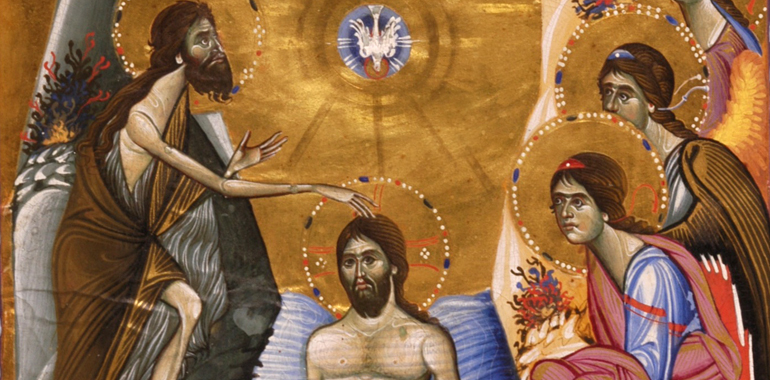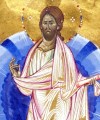
The Christian journey begins with a powerful, ancient act: a priest immerses the child in water and announces, “I baptize you in the name of the Father, and of the Son, and of the Holy Spirit.” (Matthew 28:19)
The Lord Jesus himself received baptism and chrismation in the river Jordan. He was baptized with water at the hands of John the Forerunner and thus showed his solidarity with sinful men (Matthew 3:16-18). He expected his followers to be baptized the same way that he was, and so instructed his disciples (Matthew 28:1-9).
What is baptism?
Simply put, baptism is our death, burial, and resurrection in union with Jesus Christ. It is a rite of passage, given by Christ to the Church as an entrance into the Kingdom of God and eternal life. The apostle Paul describes the promise of God in this sacrament when he writes, “Therefore we were buried with Him through baptism into death, that just as Christ was raised from the dead by the glory of the Father, even so we also should walk in newness of life.” (Romans 6:4)
When should I baptize my child?
Church canons advise baptism on the eighth day after birth. In any case, parents are advised to baptize their child as soon as possible within the first few months of birth.
A Christening in the Armenian Orthodox Church includes the three most important sacraments in one ceremony: Baptism, Confirmation (Chrismation) and Holy Communion (Holy Eucharist). Baptism is the first sacrament, and is essential if we want to receive any other sacrament.
This momentous event embodies a wealth of meanings: of being washed or forgiven of sin, of being born again into a new way of life, of entering the life and community of the universal Church, of being anointed by the Holy Spirit, of renouncing self-centeredness, and of promising to live in Christ’s love and service.
Christ himself was baptized by John, not because He was sinful and needed to repent, but because through His own baptism He showed that He was God’s Beloved Son, the Savior, the Messiah, the “Lamb of God who takes upon himself the sins of the world.” (Matthew 3, Mark 1, Luke 3, John 1-3, Acts 19:4) In the new covenant, baptism is the means by which we enter the Kingdom of God (John 3:5) and joined with Christ (Romans 6:3) and granted the forgiveness of sins as well as the gift of the Holy Spirit (Acts 2:38).
What results from Baptism?
A dying to sin daily in our lives: St. Paul writes to the Colossians (Col. 2:12) concerning baptism, “Therefore put to death your members which are on the earth: fornication, uncleanness, passion, evil desire, and covetousness, which is idolatry.” (Colossians 3:5)
A resurrection of righteousness: A dynamic and real life in Christ on earth now, joined with Him in His glorified humanity and indwelt by God Himself. Our life in Christ, our new birth and entrance into the Kingdom of God holds the promise of everlasting life.
An intimate and continual communion with God: We are raised to new life with the purpose of union and communion with God. Baptism is the beginning of eternal life. Peter writes how baptism saves us, “…It is not the mere removal of dirt from our bodies, but provides us with a ‘good conscience toward God’.”
GUIDELINES
Please try to schedule your baptism ceremony at least two months in advance by calling the church office. The office will provide the parents additional details and forms at that time. According to the Armenian Church canons, a Baptism may only be performed once in a person’s lifetime, provided such Baptism has been performed in a Christian Church and in the name of the Holy Trinity. At least one of the godparents must be a member of the Armenian Orthodox Church.
Download detailed Guidelines for your child’s Baptism HERE.
Fill out a Baptismal Application online or download the form and bring it to the church office.


